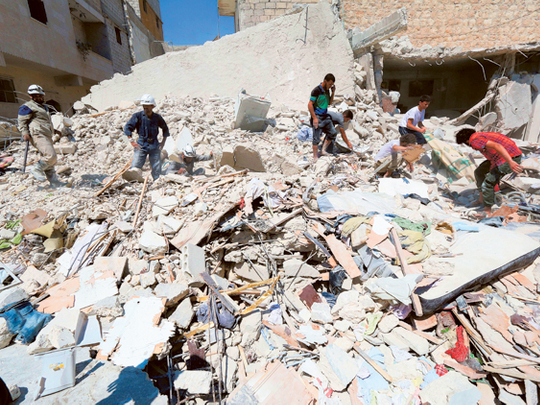
Beirut: The Islamic State of Iraq and the Levant (Isil) has crushed a pocket of resistance to its control in eastern Syria, crucifying two people and executing 23 others in the past five days, a monitoring group said on Monday.
The insurgents, who are also making rapid advances in Iraq, are tightening their grip in Syria, of which they now control roughly a third, mostly rural areas in the north and east.
The group, an Al Qaida offshoot, has fought the Syrian army, Kurdish militias and Sunni Muslim tribal forces.
The Syrian Observatory for Human Rights, a Britain-based monitoring organisation opposed to the Al Assad regime, and residents in Syria’s east said that fighters from the Al Sheitaat tribe in eastern Deir Al Zor had tried to resist Isil’s advance this month.
In Al Shaafa, a town on the banks of the Euphrates river, Isil beheaded two men from the Al Sheitaat clan on Sunday, the Observatory said, and gave residents a 12-hour deadline on Monday to hand over members of the tribe.
In other parts of Deir Al Zor province, the militants crucified two men for the crime of “dealing with apostates” in the city of Mayadin, and two others for blasphemy in the nearby town of Al Bulel, the Observatory said.
Isil has made rapid gains in Syria since it seized northern Iraq’s largest city, Mosul, on June 10, and declared an “Islamic caliphate” on territory it controls in Syria and Iraq.
The Observatory said a further 19 men from the Al Sheitaat tribe were executed on Thursday, 18 shot dead and one beheaded, on the outskirts of Deir Al Zor city. It said the men worked at an oil installation.
“No one will now dare from the other tribes to move against Isil after the defeat of the Al Sheitaat,” said Ahmad Ziyada Al Qaissi, an Isil sympathiser contacted by Skype from Mayadin.
Tribal sources say the conflict between Isil and the Al Sheitaat tribe, who number about 70,000, flared after Isil took over of two oil fields in July.
One of those, Al Omar, is the biggest oil and gas field in Deir Al Zor and has been a lucrative source of funds for rebel groups.
The head of the Al Sheitaat tribe, Shaikh Rafaa Aakla Al Raju, called in a video message for other tribes to join the fight against Isil.
“We appeal to the other tribes to stand by us because it will be their turn next ... If [Isil] are done with us, the other tribes will be targeted after Al Sheitaat. They are the next target,” he said in the video, posted on YouTube on Sunday.
A Syrian human rights activist from Deir Al Zor who fled for Turkey last year said rebels opposed to President Bashar Al Assad had retreated to Al Sheitaat tribal areas from which they had been trying to mount resistance to Isil’s expansion.
He said, on condition of anonymity, that the resistance had been crushed in the last few days. “The situation is very bad, but the people can’t repel them,” he said.
He said that in tandem with their violent campaign, Isil was distributing gas, electricity, fuel and food to garner local support.
“It is a poor area. They are winning support this way. They won a lot of support this way. They are halting theft and punishing thieves. This is also giving them credibility.”
More than 170,000 people have been killed in Syria’s civil war, which pits overwhelmingly Sunni Muslim rebels against Al Assad, a member of the Alawite minority, backed by Shiite militias from Iraq and Lebanon.
The insurgency is split between competing factions, with Isil emerging as the most powerful.
In Raqqa, Isil’s power base in Syria, its hold appears to be growing only firmer even as Syrian government forces intensify air strikes on territory held by the group.
One Syrian living in an area of Isil control near Raqqa said the number of its fighters in the streets had grown dramatically in the last few weeks, particularly since it captured the army’s 17th Division at the end of July.
The group has carried out beheadings, levied a tax on non-Muslims, and settled foreign fighters in confiscated homes, said the resident, who asked for anonymity due to security concerns.
But despite that, as in Deir Al Zor, it has won a degree of respect among locals by curbing crime using extreme means. For youths without work, salaries offered by Isil are one of the few sources of income.
“The [Islamic] State [of Iraq and the Levant] has respect and standing and its voice is heard,” said the resident, speaking by Skype.











